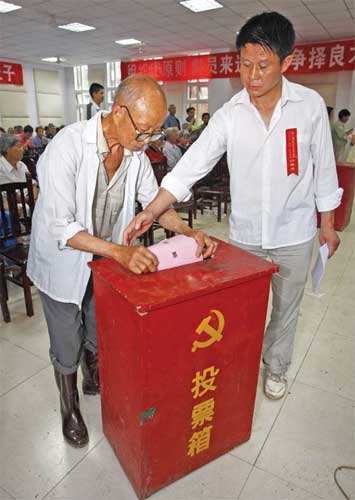Performance gives mandate to Party
Updated: 2011-06-24 10:52
By John Wong (China Daily European Weekly)
|
|
The Communist Party of China today, with its membership of over 78 million, boasts the world's largest political party.
In this age of market driven globalized economic growth and rising economic affluence everywhere, the term "Communist Party" seems to be an anachronism. The classical definition of "communism" based on the notion of proletariat dictatorship and abolition of private property ownership sounds particularly unrealistic and irrelevant to the present highly materialistic generation, both in and out of China.
But for any political party in this day and age, whatever name it carries is no longer as important as how it actually functions and how it actually serves its people. The CPC is more of a pragmatic ruling party rather than an ideological "Communist" Party.
However, the CPC is not just any ordinary ruling party. It is still different from many other political parties the world over, particularly in terms of performance.
The CPC has a mission to stay in power so as to transform and develop China. Whereas most political parties in other countries go for short-term policies, the CPC desires long-term policies and addresses long-term development needs.
Not surprisingly, the CPC has become an achievement-oriented political party. The CPC's overall performance in terms of China's economic development and social progress for the past three decades has been truly remarkable. Thanks to Deng Xiaoping's success in economic reform by first removing its rigid ideological straightjacket on the economy and society, the CPC was able to launch an industrialization program on such a massive scale that human history has never before witnessed. Successful industrialization in turn led to near double-digit rates of economic growth. China's total GDP increased 80 times from 1979 to 2010, making it the world's second largest economy today.
The CPC is thus known to Chinese people as a party that delivers successful economic growth, generates employment, and creates wealth. In fact, its "mandate from heaven" to lead China largely stems from its high performance in the economic arena.
Contrary to common misperception, China's economic growth has actually been accompanied by an extensive trickle-down effect. This is clearly manifested in China's most creditable achievement - lifting millions of people out of poverty. In short, the CPC has turned many of the "proletariat" into a property-owning and car-owning middle class. In 2010 alone, total automobile sales in China amounted to 17 million units.
Rapid economic growth has naturally produced many undesirable social side effects, including acute problems like increasing income inequality and serious environmental degradation, which are crying out for attention. Many of these problems can be and will be gradually resolved through further economic growth, as growth itself will generate the necessary resources to deal with them.
Other problems need active policy intervention. For the CPC, there is no lack of political will to tackle them. In fact, the newly released 12th Five-Year Plan (2011-2015) is basically designed to address those problems. With little doubt, the CPC will continue to effectively manage China's various problems on the economic and social fronts.
Going forward, the major challenge to the CPC in the future will come from the political front. After successful economic reform and development, it is high time for the CPC to tackle political reform, following Deng Xiaoping's priority of letting economic reform take precedence over political reform.
In fact, the CPC's top leadership has already embraced the idea of democracy. Hu Jintao, general secretary of the Central Committee of the CPC, has said "without democracy, there is no modernization". The CPC is presently concentrating on intra-Party democracy and experimenting on local elections. But the process needs to be stepped up in future. Many scholars take the view that further political reform is an inevitable part of China's social development.
For the CPC to stay in power and stay relevant, it needs to constantly adapt and change in line with changing political and social situations. The CPC under the present leadership has earned its legitimacy by bringing unprecedented economic prosperity to China.
The challenge for the CPC's future leadership is to complete China's unfinished business of political reform by implementing a new political order that is not just more open and more liberal, but also socially and culturally compatible with China.
The author is professorial fellow and academic adviser of the East Asian Institute, Singapore. He was formerly its research director.
E-paper

Shining through
Chinese fireworks overcome cloudy times, pin hopes on burgeoning domestic demand
Pen mightier than the sword
Stroke of luck
Romance by the sea
Specials

90th anniversary of the CPC
The Party has been leading the country and people to prosperity.

My China story
Foreign readers are invited to share your China stories.

Green makeover
Cleanup of Xi'an wasteland pays off for ancient city

